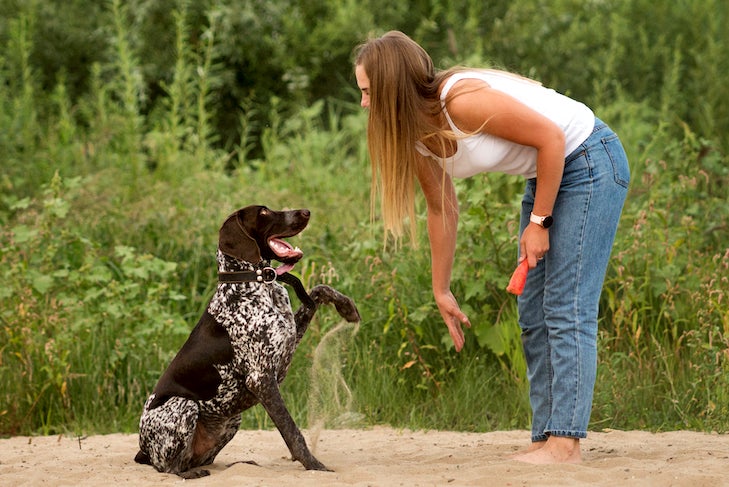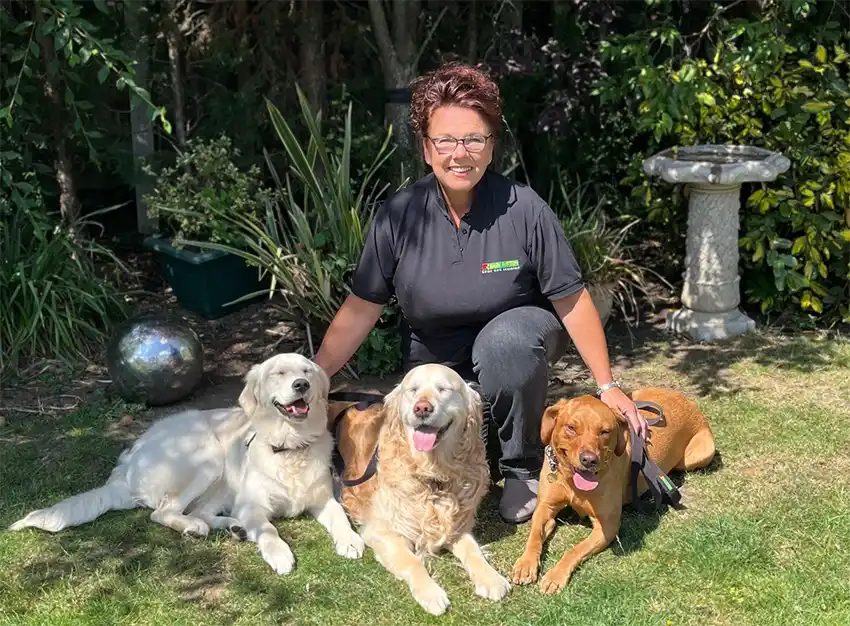The Ultimate Guide to Dog Training: Change Your Animal's Actions
Effective pet dog training is necessary for cultivating a harmonious connection between animals and their owners. The intricacies of canine actions and the application of structured training strategies play a critical function in this procedure. By comprehending the concepts of favorable reinforcement, consistency, and socialization, pet dog owners can navigate usual difficulties that occur during training. This guide not just intends to equip you with the essential devices to transform your canine's actions however likewise invites you to discover how these fundamental principles can bring about a deeper link with your pet dog. What could be the initial step in this transformative journey?
Comprehending Pet Dog Habits
Understanding pet habits is important for reliable training and an unified connection in between pets and their proprietors. A pet dog's behavior is influenced by a mix of genetics, environment, and experiences. Dog training. Recognizing these elements allows owners to customize their training approaches to meet the specific requirements of their animals
Pets interact primarily through body language, vocalizations, and facial expressions. For instance, a wagging tail can suggest enjoyment or joy, while a tucked tail might signify concern or submission. Observing these hints allows owners to react suitably, enhancing favorable behaviors and addressing negative ones effectively.
Furthermore, recognizing the social structure of pets can provide understandings into their actions. Pets are pack animals, and they flourish in a structured atmosphere. Developing clear boundaries and consistent policies can prevent confusion and promote a sense of protection.
Furthermore, identifying the natural reactions of canines, such as need to chase after or dig, is vital. These impulses can be rerouted through suitable electrical outlets, such as play or exercise. By comprehensively comprehending these behavior aspects, owners can cultivate a positive training experience, eventually causing a well-adjusted and loyal canine friend.
Necessary Educating Strategies
Effective canine training depends on a range of important strategies that can substantially enhance the understanding procedure for both the canine and the owner. One essential strategy declares support, which involves fulfilling desirable habits with treats, praise, or playtime. This approach urges pets to duplicate the actions that result in positive outcomes, cultivating a trusting relationship in between the animal and owner.
Another secret technique is uniformity in commands and expectations. Utilizing the very same verbal cues and hand signals aids the pet recognize what is required, reducing confusion and advertising quicker learning. Furthermore, establishing clear borders and guidelines is vital for reliable communication.
Socialization is likewise an important element of training. Exposing pet dogs to different environments, individuals, and other animals helps them establish proper social skills and minimizes anxiousness in unfamiliar situations.
Lastly, persistence and timing are vital. Training sessions need to be short but regular, ensuring that the canine continues to be engaged and responsive. By employing these important strategies, owners can create a positive and organized training experience that promotes etiquette and strengthens the bond with their canine companions.
Creating a Training Schedule
Just how can a well-structured training timetable enhance a pet dog's learning experience? A training timetable supplies uniformity, making certain that pet dogs receive routine, concentrated guideline. This predictability assists pets comprehend what is expected of them, reinforcing their learning and enabling better retention of habits and commands.
When creating a training schedule, it is vital to take into consideration the canine's age, type, and individual temperament. Young pups may gain from much shorter, extra regular sessions, while grown-up canines might flourish with longer, much less regular training durations. Incorporating a variety of activities can likewise maintain the sessions involving, avoiding dullness and advertising enthusiasm for learning.
Furthermore, organizing training sessions at particular times of the day can aid strengthen a regimen. Pairing training with everyday walks or playtime can develop a positive association with understanding. It is likewise essential to consist of time for support, such as deals with or praise, to compensate preferred behaviors without delay.
Finally, flexibility is essential. While consistency is crucial, being adaptable to the canine's state of mind or energy degree can enhance their learning experience. discover this info here A well-crafted training schedule ultimately lays the foundation for efficient interaction and a stronger bond between the pet and owner.
Usual Educating Difficulties
Despite having a well-structured training schedule, canine owners frequently experience numerous difficulties during the training process. One typical problem is incongruity in signs and commands. When numerous family members use different terms or tones, a pet might end up being overwhelmed, hindering its capability to find out efficiently.
Another constant obstacle is interruption. Dog training. Dogs are normally interested animals, and outside stimulations such as other pets, sounds, or people can divert their focus throughout training sessions. This needs owners to produce a regulated environment or slowly introduce interruptions to reinforce focus
In addition, varying power levels can influence training end results. High-energy pets may have a hard time to clear up down and focus, while more laid-back breeds might require additional motivation to engage. Tailoring the training method to fit the private pet's go to this site personality is necessary for success.

Structure a Solid Bond
A solid bond between a dog and its proprietor is necessary for successful training and overall well-being. Dog training. This relationship fosters trust, which is critical for efficient communication during the training process. When a pet feels safe and connected to its proprietor, it is most likely to react positively to hints and commands
To build this bond, consistency is essential. Establishing a routine that consists of routine feeding, exercise, and training sessions helps produce a sense of stability. In addition, favorable reinforcement strategies, such as treats, appreciation, and play, enhance preferred actions while strengthening the psychological link.
Socialization is an additional vital element of bond-building. Exposing your dog to various settings, individuals, and other pets helps them really feel extra confident and comfortable, improving the bond with their Home Page owner. Engaging in activities together, such as strolling, playing bring, or getting involved in obedience training, advertises teamwork and mutual pleasure.
Final Thought

Comprehending dog behavior is crucial for reliable training and a harmonious relationship between canines and their proprietors.Effective pet dog training relies on a variety of crucial techniques that can considerably enhance the learning process for both the proprietor and the canine.Regardless of having a well-structured training schedule, canine owners usually run into numerous obstacles during the training process.In conclusion, reliable pet training counts on a detailed understanding of canine behavior, the application of vital methods, and the facility of a structured training routine. By stressing positive support and uniformity, canine proprietors can substantially boost their pets' habits, ultimately making sure an unified relationship and promoting the well-being of both the canine and its atmosphere.